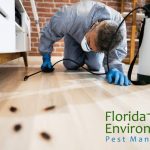Pest infestations are a common problem faced by many households. These unwelcome guests not only cause damage to our property but can also pose health risks to us and our loved ones. While there are various ways to control pests, it is important to choose methods that are safe for both humans and the environment. One crucial aspect that often gets overlooked when dealing with pest control is indoor air quality.
Indoor air quality refers to the level of pollutants present in the air inside our homes or buildings. The quality of indoor air can significantly impact our health as we spend a considerable amount of time indoors. According to the Environmental Protection Agency (EPA), poor indoor air quality can cause various health issues such as allergies, respiratory problems, headaches, and even cancer.
When pesticides or other harsh chemicals are used for pest control, they release harmful toxins into the air we breathe indoors. These toxins can linger long after the application of pesticides and continue to affect our health and well-being. Therefore, it is crucial to opt for safe pest control methods that do not compromise indoor air quality.
1) Choose natural pest control methods: Instead of reaching out for chemical-based pesticides, consider https://www.ausibiz.com/safe-pest-control-pty-ltd-1300-119-086 using natural alternatives such as neem oil spray or diatomaceous earth. These materials are environmentally friendly and do not release harmful chemicals into the atmosphere.
2) Properly ventilate your space: Indoor spaces can become stuffy if there isn’t proper ventilation which impacts indoor air quality negatively. By keeping windows open or using exhaust fans while using pesticides, you allow fresh outdoor air to circulate inside your home thus reducing exposure to harmful chemicals.
3) Read labels carefully: If you must use chemical-based pesticides or insecticides, make sure you read labels carefully before use. Look for products that have been tested and approved by regulatory bodies such as EPA; these products must meet safety standards and have minimal impact on indoor air quality.
4) Hire a professional pest control service: Professional pest control services have access to safer, low toxicity products that are more effective in controlling pests without compromising indoor air quality. They also have the expertise to handle these chemicals safely and minimize any potential harm.
5) Consider Integrated Pest Management (IPM): IPM is an eco-friendly approach that focuses on prevention, monitoring, and control of pests by using a combination of methods such as biological control, cultural practices, habitat manipulation, and limited use of pesticides. This method minimizes the use of chemicals, thus reducing their impact on indoor air quality.
In conclusion, while dealing with pesky pests in our homes or buildings, it is essential to prioritize the safety of our indoor air. By choosing natural methods or using approved products with caution and proper ventilation techniques you can effectively control pests without harming your health or compromising your well-being. Remember: safe pest control goes hand in hand with maintaining good indoor air quality for a healthy living space.





